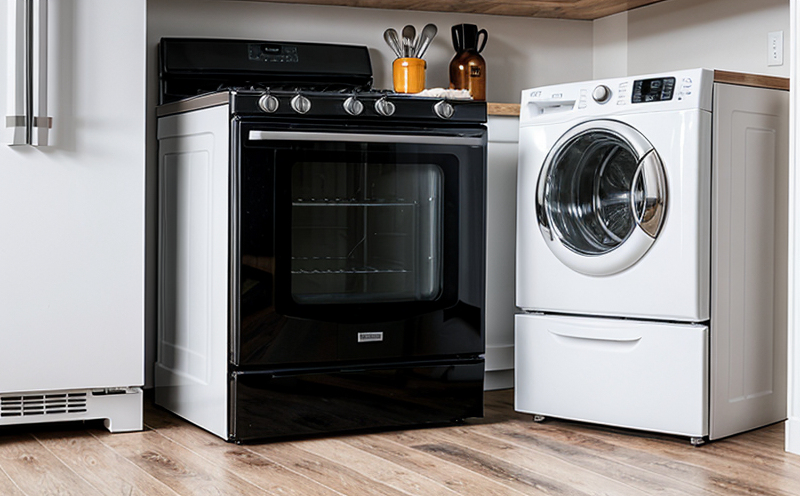Water Heater Performance Testing
The testing of water heaters is a critical process in ensuring consumer safety and compliance with regulatory standards. Water heaters are essential appliances that provide hot water for various household needs, from bathing to laundry. Ensuring their performance meets the required specifications not only enhances user experience but also contributes to environmental sustainability by optimizing energy efficiency.
Water heater performance testing involves a series of evaluations aimed at assessing key parameters such as temperature regulation, energy consumption, durability, and safety features. The primary goal is to ensure that water heaters meet or exceed the specified standards set forth by relevant international bodies like ISO (International Organization for Standardization), ASTM (American Society for Testing and Materials), and EN (European Norms).
During testing, several factors are considered:
- Temperature Regulation: The ability of the water heater to maintain a consistent temperature within acceptable limits.
- Energy Efficiency: Measuring how much energy is consumed versus the amount of hot water produced. This helps in determining if the appliance operates efficiently and sustainably.
- Durability: Assessing the longevity and reliability of the water heater under various operating conditions.
- Safety Features: Evaluating features like anti-scald protection, pressure relief valves, and overall safety certifications to ensure they comply with industry standards.
The testing process typically begins with a thorough inspection of the unit, followed by installation of monitoring devices. Once installed, continuous operation over extended periods allows for accurate data collection on performance metrics. After testing, detailed reports are generated summarizing findings and suggesting improvements where necessary.
For quality managers and compliance officers responsible for ensuring product integrity within their organizations, understanding these nuances is crucial. By leveraging robust testing protocols, they can make informed decisions about product design, manufacturing processes, and regulatory compliance. R&D engineers benefit from this information as it provides insights into potential areas of improvement which could lead to innovative advancements in technology.
Additionally, procurement professionals involved in sourcing components or materials for water heater production would find value in knowing how different elements impact overall performance. This knowledge helps them choose suppliers who deliver high-quality parts that contribute positively towards final product quality.
Scope and Methodology
The scope of water heater performance testing encompasses both laboratory-based evaluations as well as field deployments where appropriate. Laboratory tests provide controlled environments allowing precise measurements while field trials offer real-world conditions reflecting actual usage scenarios.
Key methodologies employed include:
- Thermal Analysis: Measuring the temperature distribution throughout the water heater to ensure even heating across all components.
- Energy Monitoring: Tracking electrical or gas consumption rates during operation cycles.
- Durability Testing: Subjecting units to repeated cycles of hot and cold water supply to assess wear patterns over time.
- Safety Checks: Conducting thorough inspections for any signs of malfunction or potential hazards.
In addition to these technical aspects, user feedback plays a significant role in refining test procedures. Customer experiences can highlight issues that might not be apparent through purely scientific methods alone. This comprehensive approach ensures that all relevant factors influencing water heater performance are accounted for.
Industry Applications
The results of water heater performance testing have wide-ranging applications across multiple sectors including residential construction, commercial facilities, and industrial operations. In the residential sector, it contributes to improving home comfort levels by providing reliable hot water services consistently. For commercial establishments like hotels or restaurants requiring large volumes of hot water, this service ensures operational efficiency without compromising safety standards.
Incorporating stringent testing procedures into procurement strategies allows companies to select suppliers based on verified performance data rather than assumptions alone. This enhances supply chain reliability and reduces risks associated with substandard products entering the market.
Moreover, regulatory compliance is paramount in many countries around the world. Meeting these requirements helps businesses avoid penalties and maintains trust among consumers who expect safe, effective appliances. By investing in thorough testing services early on, organizations can stay ahead of changing regulations and maintain a competitive edge in the marketplace.
Eurolab Advantages
At Eurolab, we pride ourselves on offering unparalleled expertise when it comes to water heater performance testing. Our state-of-the-art facilities equipped with advanced instrumentation allow us to conduct rigorous tests that meet international standards. With experienced professionals dedicated solely to this field, our team brings years of combined experience to every project.
Some key advantages include:
- Comprehensive Testing Capabilities: We cover all aspects mentioned above ensuring no detail is overlooked during the evaluation process.
- Accurate Reporting: Detailed reports are provided immediately after completion of each test series, offering clear insights into performance metrics and recommendations for improvement.
- Regulatory Compliance: Ensures that your products meet all necessary certifications and requirements imposed by governing bodies worldwide.
- Customer Support: Ongoing support is available to help interpret results and implement changes where needed.
Choose Eurolab for all your water heater performance testing needs. Our commitment to excellence ensures that you receive accurate, reliable data that can be confidently used in decision-making processes related to product development or procurement strategies.





